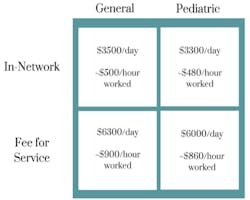Why is it important to track the dentist's production?
This KPI provides the big picture of how your practice is doing at any given time. A busy practice is not necessarily a productive one. If you have a schedule full of patients and your numbers are not justifying the busyness, taking a look at doctor production can help you identify any issues. Here are some factors that can help.
- Case acceptance—Is your acceptance low, perhaps due to an inefficient treatment coordinator or office manager? Developing better systems or training your team can improve this and positively affect doctor production.
- Same-day treatment—Are you maximizing appointment times by offering same-day treatment? If not, this can lead to more doctor time overall, which negatively affects your doctor production.
- Team efficiency—Implementing best practice systems and spending the time to properly train staff can have a big effect on doctor production.
- Proper use of ADA codes—Make sure all procedures performed are properly submitted in order to maximize production for each appointment.
So, you’ve started monitoring your daily doctor production. Where do you go now? How do you determine whether or not your practice is performing at the level it should be? These are the questions I’ll answer here.
Before diving into specific numbers, it’s important to note that all offices are different and they need to create goals that consider the variety of factors affecting their prices. All of the following factors play into determining an appropriate doctor-production goal.
- Practice location—Are you located in a big city or a small town, on the east or west coast?
- Competition—Are there five practices like yours in your zip code, or are you the only practice in town?
- Insurance—Are you a fee-for-service practice or in network with every insurance, or are you somewhere in between?
- State laws—Some states require hygienists to be certified to see pediatric patients and some do not, therefore, how production is allocated between doctors and hygienists will vary.
- Specialty—Is yours a general practice, a pediatric practice, or other speciality?
Using data from more than 12,500 dental practices compiled by Sikka Software, we have a good indication of how a dentist’s production in the average dental practice is looking. Below are the average numbers from the last seven years.
Doctor net production per hour
2010 – $251.31
2011 – $233.43
2012 – $191.35
2013 – $191.66
2014 – $195.04
2015 – $205.57
2016 – $216.24
Despite the large number of variables mentioned here, here is a chart that gives practices a ballpark area to work with. The chart is based on a practice in a moderately populated area with a decent amount of competition, two hygienists working, and seven hours worked during a day.
For the most current practice management headlines, click here.
For the most current dental headlines, click here.
Note: Now is a great time to connect with your patients and ask for referrals. Use the secure video communication and messaging capability of Sikka Software's Practice Mobilizer at practicemobilizer.com. Or, if you want a fullscale patient retention analysis and return on investment calculation, visit Practice Optimizer, which works seamlessly with more than 96% of the practice management software on the market, at sikkasoft.com/DentalPOPremium.



